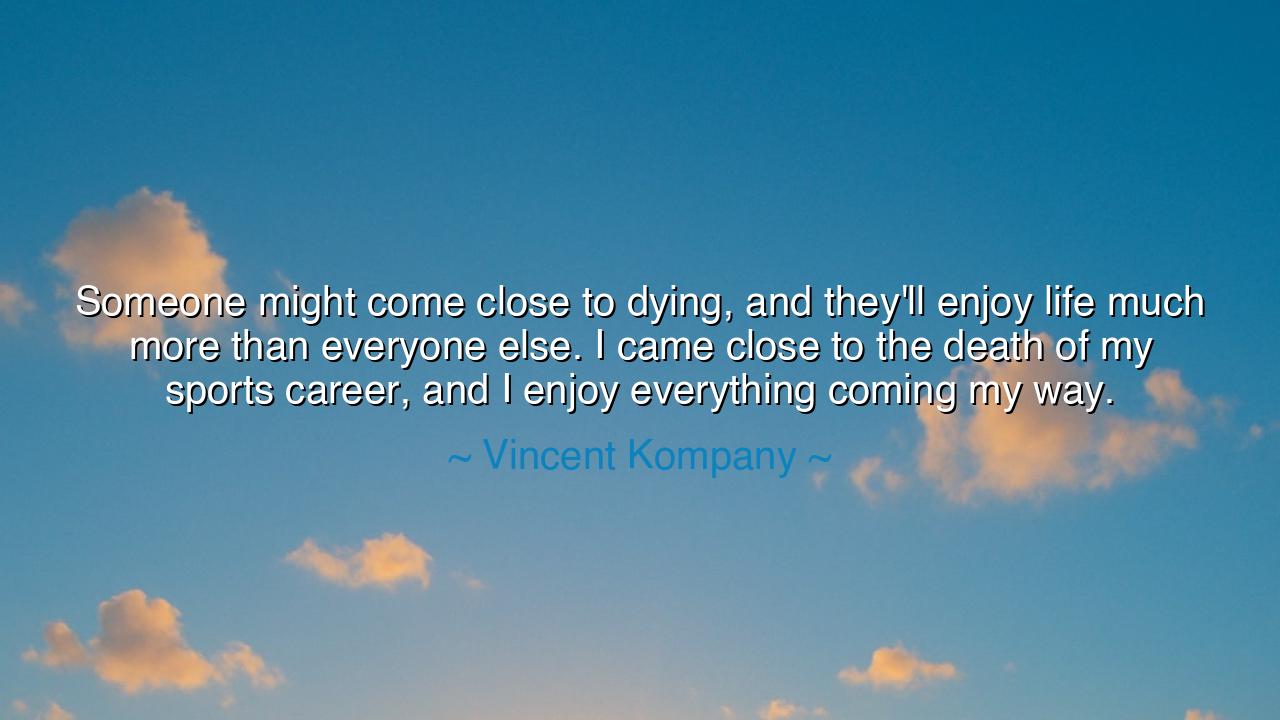
Someone might come close to dying, and they'll enjoy life much
Someone might come close to dying, and they'll enjoy life much more than everyone else. I came close to the death of my sports career, and I enjoy everything coming my way.






The words of Vincent Kompany carry the tone of one who has walked through fire and emerged with new eyes: “Someone might come close to dying, and they’ll enjoy life much more than everyone else. I came close to the death of my sports career, and I enjoy everything coming my way.” This is not merely the reflection of an athlete, but a timeless truth about how the shadow of loss awakens the soul to the brightness of what remains. For those who have looked upon the edge of the abyss know better than most how radiant each moment of life can be.
He begins with the image of death, not as an end but as a teacher. When a man comes near to losing all, the smallest details of life—food, breath, the laughter of friends—suddenly glow with sacred meaning. What others pass by blindly, he treasures as gifts. Kompany, having faced the possible end of his career, understood this wisdom: that only by nearly losing what we love do we learn to truly love it. His words remind us that fragility itself makes life precious.
The ancients knew this lesson well. Marcus Aurelius, emperor and philosopher, often wrote of mortality, urging himself to see each sunrise as a blessing, for death could come at any hour. By meditating on loss, he deepened his gratitude for life. In the same way, Kompany turned the injury and uncertainty of his career into a source of joy. What could have been bitterness became clarity, and from near-despair he drew strength to savor the game again.
History offers another mirror in the tale of Lance Armstrong, who faced cancer at the height of his athletic prime. Though controversy later clouded his story, one truth remained: his brush with death gave him a fierce appreciation for life itself. He would later say that the battle with illness made victories sweeter and suffering more bearable. Like Kompany, he shows us that close encounters with the end awaken new beginnings within the heart.
Kompany’s words also remind us that perspective is power. Many athletes fall into pride, complaints, or despair over minor setbacks. But one who has faced the possibility of total loss embraces every small triumph, every chance to play, every cheer of the crowd. Gratitude becomes his weapon, joy his armor. He no longer measures life in trophies alone, but in the gift of simply being able to continue. This perspective is what makes the difference between bitterness and resilience, between quitting and enduring.
The lesson for us is profound: do not wait until the edge of loss to awaken to life. Do not wait until death knocks at your door, or until your career, your health, or your family is almost taken, before you learn to rejoice in them. Practice gratitude now. See each day as Kompany saw his second chance, as a gift worth savoring. For in truth, all of us stand closer to loss than we imagine, and the only wise way to live is to love fiercely what we have while it is ours.
Therefore, children of tomorrow, remember this: suffering and near-loss are not curses but teachers. When trials come, let them sharpen your gratitude, not darken it. When something precious is nearly taken, let that nearness deepen your joy in what remains. For the one who has walked near to death—whether the death of body, career, or dream—knows better than most that life is sweetest when it is fragile.
Thus, Vincent Kompany’s words, though born of an athlete’s struggle, stand as eternal wisdom: to almost lose is to almost learn, and to learn is to live more fully. Take this truth into your heart, and savor every gift that comes your way—not someday, not after loss, but today, while life still shines upon you.






AAdministratorAdministrator
Welcome, honored guests. Please leave a comment, we will respond soon